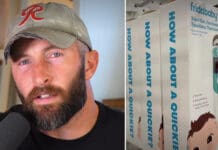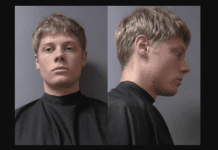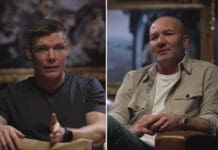In a recent speech at New York University, lawyer and former gymnast Rachael Denhollander revealed that her childhood experiences in church set the stage for her later victimization by Larry Nassar. Before Denhollander was abused by him at age 15, she was sexually abused by someone in her church at age seven, and she says the adults at church only “compounded” the damage.
“When my parents took steps to protect me, the response of the adults that had surrounded me, that formed my concept of God, that formed my concept of church family, was to respond very vitriolically,” says Denhollander.
She did not tell anyone then that she had been abused and says that the perception of some of the adults at the church was that, “Because I had not verbalized the abuse, I hadn’t proved it. And because I hadn’t proved it, these adults were not motivated to protect me. But they were motivated to isolate me and my family.” It was only because her parents took precautions at the advice of some people who had noticed the predator’s grooming that the abuse stopped before it became severe. Still, any abuse has serious consequences for the victim.
Denhollander says she was confused by the hostility she received from adults she had trusted and respected. At age 12, she started processing what had happened and finally told her parents that she had been abused when she was younger. Then she discovered why the church had ostracized her when she was seven. When she realized what the reason was, the message she internalized was, “If you can’t prove it, don’t speak up.” Otherwise, “You will lose everything.”
A Toxic Message
That message in turn “groomed” Denhollander for what she was to suffer from Larry Nassar, whom she went to see after experiencing a back injury. Nassar was a doctor for Michigan State University and the USA national gymnastics team who serially molested children for years and also pled guilty to charges relating to child pornography. At that time she sought treatment, all that Denhollander knew about Nassar was that he was a respected physician who had an almost “godlike” status in the world of gymnastics. When Denhollander met him, he’d already been abusing girls for almost a decade and was a “hardened and skilled sexual predator.” Four people had reported his abuse by then, but those responsible covered up the allegations. Denhollander says that when “things didn’t seem right,” she remembered what she’d learned from the church about the importance of staying quiet, so she didn’t say anything for a year. She thought that for sure the adults around her would have said something if he was really doing anything wrong.
“What I had to wrestle with,” Denhollander says, “when I finally came to grips with the abuse that occurred was that I hadn’t just been betrayed by somebody that I trusted. I had been betrayed by everybody that surrounded him.” She eventually told her parents, but neither she nor they were sure what to do or how they were going to get anyone to believe them. Denhollander feared the impact of accusing Nassar because she knew the story would get national attention. It was not until 16 years later when she read an Indianapolis Star exposé on USA gymnastics coaches that she realized she needed to speak out.
She filed a police report, started the criminal investigation process, the Title IX process, and contacted the Star, offering reporters any information they wanted for a story. They agreed to interview her. She emailed her friends and family about what she was doing so they wouldn’t have to read it in the paper first. Denhollander says she felt like she gave up all her privacy and dignity: “The fallout from my interview…was every bit as nasty as I expected it to be. But the result was incredible.” Over 400 women eventually came forward saying they were also victims of Nassar. He is now in prison for the rest of his life. Some of the victims of child porn were found, and there is increasing accountability and awareness in society about sexual assault.
God Provides Hope
Denhollander goes on in her speech to explain her struggle with how to understand justice and forgiveness in the face of what happened to her. Despite how the church wounded her as a child and despite the fact that she had to turn to secular media to be heard, Denhollander did not turn her back on Christianity. In fact, she explains that it is Christianity that gives a satisfactory answer to our desire for both love and justice because it tells us that God pours out his wrath on evil because he cares for us. While we often have a negative view of God’s wrath, we need to understand that just as we desire justice for the evils committed by Nassar, God’s love means that He desires that same justice.
Denhollander says, “Only in the Christian faith do we have a God who unfailingly loves enough to always bring justice, but also unfailingly loves enough to take that justice upon Himself to make forgiveness possible… When my innocence was stolen as a young child, twice over, God saw that damage, and He said, ‘This is evil, and it matters to me.’ What happened to me matters, and it is seen, and it is heard, and someone cares, when no one else did.”














